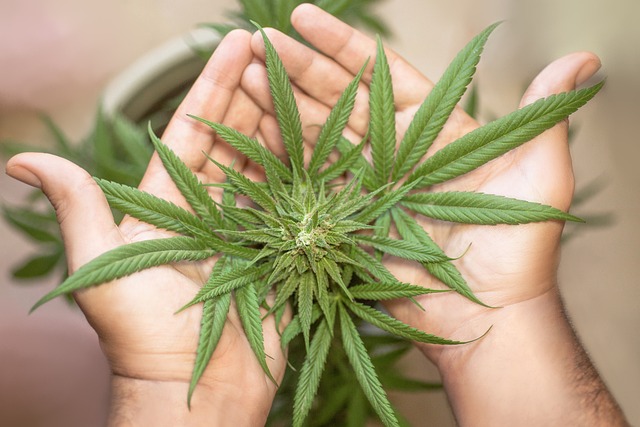Delta-9-tetrahydrocannabinolic acid (THCA) flour, derived from the cannabis plant and rich in anti-inflammatory compounds, is being recognized for its potential health benefits as a non-psychoactive alternative. Studies suggest that THCA flower can modulate immune responses and reduce inflammation, offering therapeutic effects without causing psychoactive impairment. Its efficacy is believed to be due to its interaction with the endocannabinoid system, particularly the CB2 receptors, which could make it a valuable natural option for managing pain and inflammation associated with various conditions. The THCA flower's anti-inflammatory properties are thought to work by suppressing pro-inflammatory cytokines, regulating enzymes involved in inflammation, and modulating immune cell function. This makes it a promising adjunct therapy that could complement traditional treatments for inflammatory conditions and pain management. As research continues, the full scope of THCA flower's therapeutic benefits, particularly in wellness and holistic health, is expected to be better understood.
Explore the transformative potential of THCA flower, a natural marvel with profound anti-inflammatory properties. This article delves into the intricate science behind its beneficial compounds, offering readers a comprehensive guide to understanding and utilizing this cannabinoid-rich plant. From its composition and cultivation to the impact of decarboxylation and the entourage effect, we explore how THCA flower interacts with the endocannabinoid system to alleviate inflammation. With a focus on clinical research, optimal consumption methods, and safety considerations, this piece also addresses the legal landscape and future directions in THCA’s therapeutic applications. Whether you’re a novice or well-versed in cannabis science, this article provides valuable insights into incorporating high-quality THCA flower into your lifestyle for natural anti-inflammatory relief.
- Unveiling the Potential of THCA Flower: An Overview
- The Science Behind THCA's Anti-Inflammatory Compounds
Unveiling the Potential of THCA Flower: An Overview

delta-9-tetrahydrocannabinolic acid (THCA) flour, the raw precursor to the well-known psychoactive compound THC found in cannabis, has garnered attention for its potential health benefits. THCA is non-psychoactive, making it a suitable option for those seeking the therapeutic effects of cannabis without the intoxicating high. One of the notable attributes of THCA flour is its rich profile of anti-inflammatory compounds. These compounds have been studied for their potential to alleviate inflammation, a common issue in various health conditions. Research suggests that THCA’s anti-inflammatory properties may be beneficial in managing symptoms associated with inflammatory diseases. Additionally, the anti-inflammatory action of THCA is believed to be due to its interaction with the body’s endocannabinoid system, particularly the CB2 receptors known to play a role in modulating immune responses and inflammation. This interaction could offer a natural alternative for managing pain and inflammation, an area where traditional pharmaceuticals often fall short due to their side effects. As such, THCA flour holds promise as a natural remedy with a wide range of applications, from wellness and holistic health to potentially complementary treatments in mainstream medicine. The full scope of its efficacy and the mechanisms by which it operates continue to be explored through ongoing scientific research.
The Science Behind THCA's Anti-Inflammatory Compounds

The THCA flower, which contains the non-psychoactive compound tetrahydrocannabinolic acid (THCA), has been the subject of scientific investigation for its potential anti-inflammatory properties. THCA is the precursor to THC, the primary psychoactive component of cannabis, but unlike THC, THCA does not induce psychoactive effects. Research indicates that THCA interacts with the body’s endocannabinoid system through its receptors, CB1 and CB2. This interaction is believed to exert anti-inflammatory effects by inhibiting pro-inflammatory cytokines, which are molecules that play a role in the immune response. Studies have demonstrated that THCA can modulate the activity of certain enzymes and receptors involved in inflammation, offering promise for its application in treating various inflammatory conditions. The anti-inflammatory compounds found in THCA flower may provide relief for individuals suffering from chronic inflammation without the mind-altering effects associated with other cannabinoids.
Furthermore, the therapeutic potential of THCA is underscored by its ability to target multiple molecular pathways implicated in inflammation. Preclinical studies have shown that THCA can inhibit certain enzymes responsible for the breakdown of fatty acids, which are precursors to pro-inflammatory molecules known as eicosanoids. This action may help reduce inflammation and pain. Additionally, THCA has been observed to modulate immune cell function, including that of macrophages, which are key players in the body’s immune response. The anti-inflammatory effects of THCA are not only confined to its direct interactions with immune cells but also extend to its capacity to enhance the efficacy of other anti-inflammatory treatments, making it a potential candidate for use in conjunction with conventional therapies.
THCA flower, rich in its anti-inflammatory compounds, represents a promising area of research within the realm of natural medicine. As this article has delved into the scientific properties and potential benefits of THCA, it’s evident that further investigation is warranted to fully understand its applications. The findings underscore the importance of continued exploration into cannabinoids and their therapeutic effects, offering a compelling case for the consideration of THCA flower as a natural remedy for inflammatory conditions.
